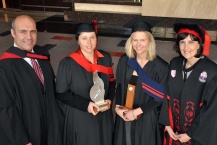 |
|
Adv. Wessel Oosthuizen, Director of the Centre for Financial Planning Law; Marilize Putter, top student in the Advanced Postgraduate Diploma in Financial Planning Law, Jenny White, top student in die Postgraduate Diploma in Financial Planning Law and Prof. Rita-Marie Jansen, Acting Dean: Faculty of Law at the UFS.
Photo: Stephen Collet
28 June 2012
|
The Centre for Financial Planning Law (CFPL) in the Faculty of Law at the University of the Free State (UFS) awarded 342 Postgraduate and Advanced Postgraduate Diplomas in Financial Planning at this year’s graduation ceremony. The ceremony was held at the Sandtion Conference Centre in Johannesburg on 19 June 2012.
Some of the distinguished guests who attended were Dr Khotso Mokhele, Chancellor of the UFS, Dr Derek Swemmer, Registrar of the UFS, Prof. Nicky Morgan, Vise-Rector: Operations at the UFS, Prof. Helena van Zyl, Director of the UFS’s Business School, Prof. Rita-Marie Jansen, Acting Dean of the Faculty of Law and Adv. Wessel Oosthuizen, Director of the CFPL. The Chief Executive Officer of the Financial Planning Institute of Southern Africa, Mr Godfrey Nti, and the Chairperson of the Board, Mr Solly Keetse, were also present at the graduation ceremony.
Marilize Putter was named as the top student in the Advanced Postgraduate Diploma in Financial Planning Law, with Jenny White the top student in die Postgraduate Diploma in Financial Planning Law.
The UFS remains the largest institution in this field. The UFS’s Centre for Financial Planning Law is also the only institution in South Africa that presents the Postgraduate Diploma in Financial Planning Law as a pure specialisation diploma.
Donors who made the event possible include:
- Craig Bentley of Alexander Forbes
- Dev Chetty of Liberty Life
- Henry van Deventer of Acsis
- Tessa Pappenfuss of Lexis Nexis
- Bertie Nel of Momentum